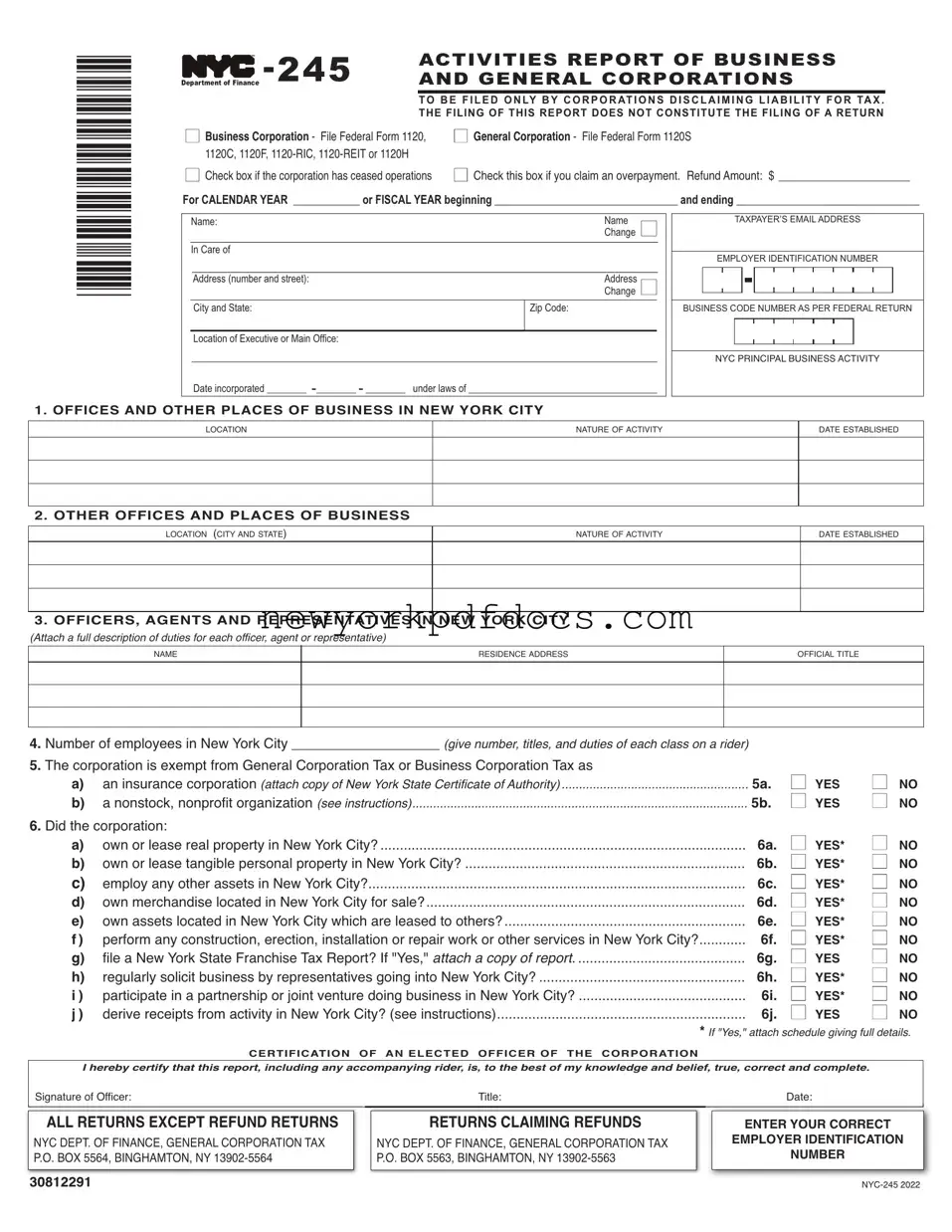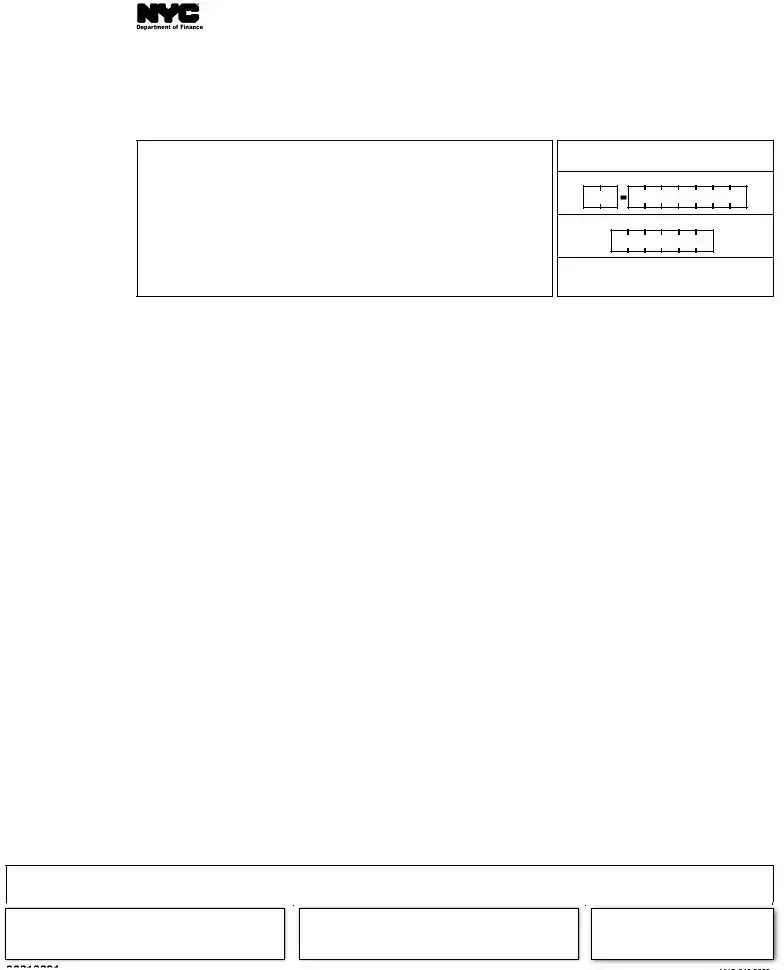out any of the purposes of its organization is deemed to be “doing business” for the purpose of the tax. In determining whether a corpora- tion is doing business, it is immaterial whether its activities actually result in a profit or a loss.
UndertheBusinessCorporationTaxapplicable to federal C Corporations for tax years begin- ning on or after January 1, 2015, a corporation is doing business in the city if:
(1)it has issued credit cards to onethousandor more customers who have a mailing ad- dress within the city as of the last day of its taxable year;
(2)it has merchant customer contracts with merchantsandthetotalnumberoflocations coveredbythosecontractsequalsonethou- sand or more locations in the city to whom thecorporationremittedpaymentsforcredit cardtransactionsduringthetaxableyear;or
(3)the sum of the number of customers de- scribed in item #1 plus the number of lo- cations covered by its contracts described in item #2 equals one thousand or more.
Additionally,fortaxyearsbeginningonorafter January 1, 2022, a corporation which does not meet the requirements of either (1), (2), or (3) above will be considered to be doing business inthecity,ifthecorporationhasatleasttencus- tomers,orlocations,orcustomersandlocations, as described above in (1), (2) and (3), the cor- poration is part of a unitary group AND if the number of customers, locations, or customers andlocations,withinthecityofthemembersof the unitary group that have at least ten cus- tomers,orlocations,orcustomersandlocations withinthecityintheaggregatemeetseither(1), (2), or (3) above.
For purposes of these provisions, the term “credit card” includes bank, credit, travel and entertainment cards. See Administrative Code Section 11-653(1)(c).
For tax years beginning on or after January 1, 2022, a C corporation will be subject to the Business Corporation Tax if it derives receipts from activity in the city and meets any one of the following:
(1)thereceiptswithinthecityare$1millionor more in a taxable year; or
(2)the corporation’s receipts from activity in thecityarelessthanonemilliondollarsbut at least ten thousand dollars in a taxable year and the corporation is part of a unitary group where the members that have at least
$10,000 of receipts within the city have, in the aggregate, receipts within the city of $1 million or more in a taxable year. SeeAd- ministrative Code Section 11-653.
Theterm“employingcapital”includesanyofa large variety of uses, which may overlap other categories and give rise to taxable status. In general,theuseof assetsinstrumentalinmain- tainingoraiding thecorporateenterpriseorac- tivity in the City will create liability. Employing capital includes activities such as:
a)maintaining stockpiles of raw materials or inventories; and
b)maintaining securities in the City for trad- ing purposes.
Under Sections 11-603.2 and 11-653(2) of the Administrative Code, a corporation is not con- sideredtobedoingbusiness,employingcapital, owning or leasing property, or maintaining an office in New York City by reason of:
a)the maintenance of cash balances with banks or trust companies or brokers in the City;
b)the ownership of shares of stock or securi- tieskeptintheCity,ifkeptinasafedeposit box, safe, vault or other receptacle rented for the purpose, or if pledged as collateral security, or if deposited with one or more banks or trust companies, or brokers who are members of a recognized security ex- change, in safekeeping or custody ac- counts;
c)the taking of any action by any such bank or trust company or broker which is inci- dental to the rendering of safekeeping or custodial service to the corporation;
d)the maintenance of an office in the City by oneormoreofficersordirectorsofthecor- poration who are not employees of the cor- poration as long as the corporation is not otherwise doing business or employing capital in the City and does not own or lease property in the City;
e)the keeping of books or records of a corpo- rationintheCityifthebooksorrecordsare not kept by employees of the corporation and the corporation is not otherwise doing business or employing capital in the City and does not own or lease property in the City; or
f)anycombinationoftheforegoingactivities.
In addition, a corporation will not be subject to the General Corporation Tax or Business Cor- poration Tax if its sole connection with New York City is:
(i)the maintenance of a statutory office at the address of its registered agent or the main- tenance of a mailing address; or
(ii)the mere ownership of shares of stock of corporations doing business in the City.
Under Administrative Code Section 11-653(2- a), an alien corporation is not considered to be doingbusiness,etc.intheCityifitsactivitiesin the City are limited solely to investing or trad- ing in stocks, securities or commodities for its ownaccountwithinthemeaningoftheInternal RevenueCode§864(b)(2)(A)or§864(b)(2)(B).
For purposes of the Business Corporation Tax, an alien corporation that under any provision of the Internal Revenue Code is not treated as a “domesticcorporation”asdefinedinIRC§7701 and has no effectively connected income for the taxable year pursuant to clause (iii) of the open- ing paragraph of Administrative Code §11- 652(8)isnotsubjecttotheBusinessCorporation Tax for that taxable year. For purposes of the Business Corporation Tax, an alien corporation is defined as a corporation organized under the laws of a country, or any political subdivision thereof, other than the United States, or organ- ized under the laws of a possession, territory or commonwealth of the United States. See Ad- ministrative Code Section 11-653(2-a).
NOTE: For additional guidance concerning what activities constitute "doing business," "employing capital," "owning or leasing prop- erty," and "maintaining an office" in NewYork City, see Sections 11-03 and 11-06 of Title 19 of the Rules of the City of New York. For ad- ditional information concerning corporations not subject to tax, see Section 11-04 of those rulesandAdministrativeCodeSections11-603 and 11-653.
REFUNDS: If a corporation has previously paidtaxormadeestimatedtaxpaymentsforthe taxable year and is filing this form disclaiming liability for those taxes, the corporation should file a refund claim and attach this form to that claim.




